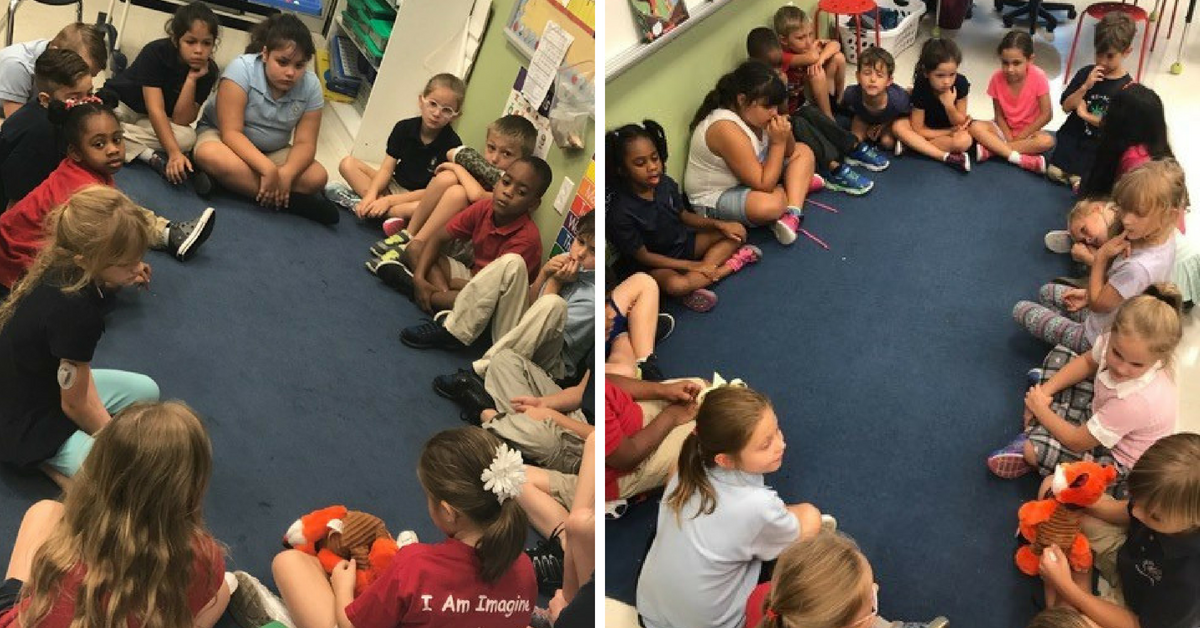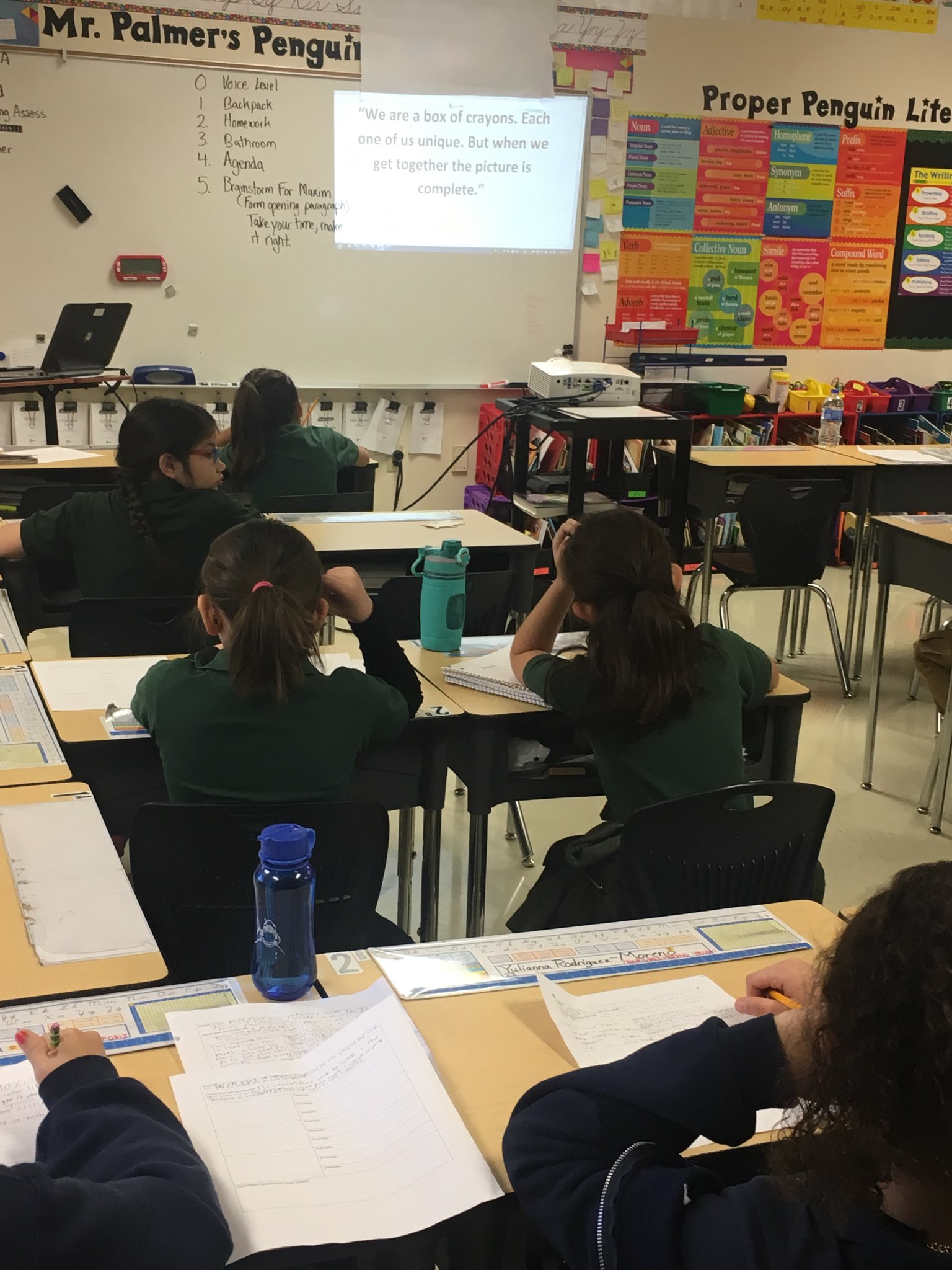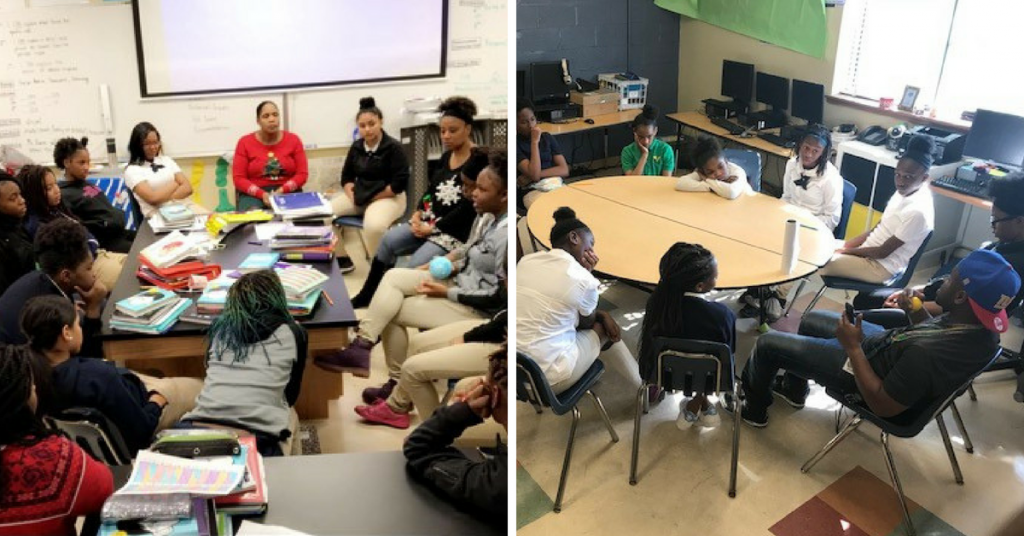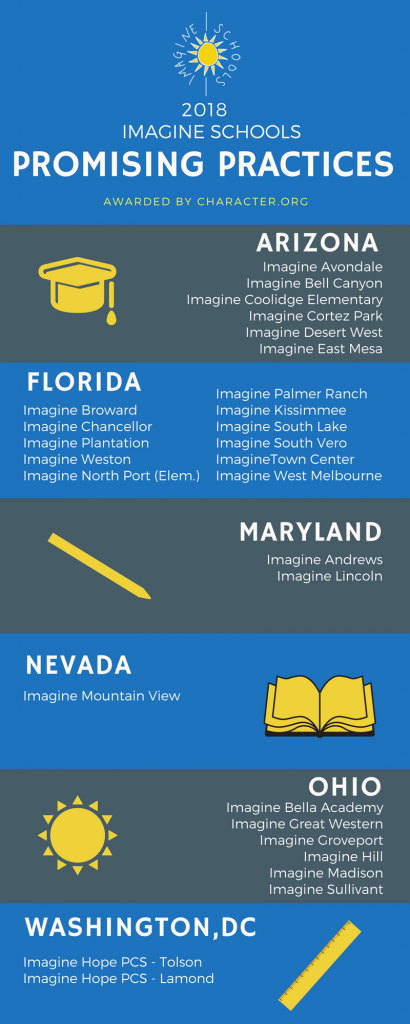
Scholars select questions from the circle basket for a Character Based Restorative Circle at Imagine School at Palmer Ranch.
Practicing Character
We love this time of year! Our older scholars are transitioning to higher education, remarkable teachers are honored and Character.org announces its Promising Practices Awards!
This year, we are so incredibly proud to share that a total of 26 Imagine campuses are being recognized. Together, the 26 schools share 41 Promising Practices, beating last year’s total of 38!
The Promising Practices are awarded to schools across the country that have successfully implemented a unique character practice that falls into one or more of the 11 Principles of Effective Character Education. Schools submit their practice to Character.org in hopes of sharing a specific program or aspect of character education with other schools to foster collaboration and character development.
The programs our campuses created this school year ranged from bullying prevention and acts of kindness to peer mentoring and mediation.
We spoke to a few campuses about their Promising Practice stories:
Imagine School Bell Canyon | Difference Makers Dig Deeper
Describe your character practice for Noteworthy readers.
“This year at Imagine Bell Canyon we focused on creating a culture of making a difference by digging deeper into the lives of our students. We worked through professional development to inspire all adults on campus to look beneath the surface of our students to better understand them, teach them and grow them. Through professional development on Trauma Informed Teaching Practices, teachers were equipped with a better understanding of how these experiences affect student behavior as well as strategies to use in the classroom. Next, all teachers and staff used class lists from the entire school to identify students with whom they felt they had knowledgeable, caring relationships. Finally, staff identified students on the list who were without an identified caring adult. This list was then divided out to both teachers and staff with the charge to dig deeper and intentionally develop meaningful caring relationships with these lesser known students. Teacher and staff participation has been encouraged and observed through regular check ins during staff meetings.”
How does your practice contribute to character development?
“Research shows that 44 percent of children in Arizona have suffered Adverse Childhood Experiences. These experiences fundamentally impact how students behave and learn in our schools. Students who tend to need the most support are often the ones who have the least support. Our Difference Maker initiative seeks to equip students with the emotional support that they need to work through the challenges of each day while giving them a caring adult to lean on. Beyond that, staff engagement in this initiative has grown throughout the last months. Staff have intentionally engaged with their matches, by giving valentines, sending letters through the school post office, eating lunch and intentionally learning more about each student. On the most recent check in, 100% of staff surveyed had made contact with their match recently. One teacher reported that after asking her match if he was coming to school the next day the student asked her why? The teacher replied, “Because you’re important and I am going to be looking for you!” “Important? I’m important?” These are the kinds of revelations that this initiative was meant to foster. Student survey data also shows concretely that this initiative is making an impact. We saw an increase from 75 percent to 79 percent of student agreement from last year to this year on the question, “I have one teacher or adult at my school who I can talk to and who really understands me.”
Imagine School at Palmer Ranch | Character Based Restorative Circles
Tell us a little about your practice.
“Our practice is utilizing restorative class circles to build community and develop character. Restorative circles are class discussions meant to build community and respond to challenging behaviors through authentic and positive dialogue. Students become stakeholders in their classroom where their thoughts, opinions and feelings are valued. This practice develops student communication skills, focuses attention on celebrating individual similarities and differences, creates a culture of empathy, engages students in active listening, reduces the time needed to manage behaviors and allows more time to be focused on learning.”
What benefits have you seen so far?
“It is widely understood that stressed brains do not learn in the same manner that lesser stressed brains do. Our practice of restorative classroom circles helps us to sustain a safe and just school community where students are better able to focus on learning and develop character-based social skills that will benefit them into adulthood. Students are happier overall, more successful in the classroom, and take more risks both academically and socially. We have received many compliments from our parents regarding our practice of classroom circles, where they share examples of their students coming home and continuing to demonstrate the positive dialogue and skills they’ve learned from the circles with family members – or even asking if they can carry out a family circle at home. Teachers report observing improved student engagement, a reduced need to intervene with student problem solving, and a reduction in problematic classroom behavior when restorative classroom circles are a consistent part of the classroom schedule. The benefits also extend beyond our school walls to the homes of our students and the communities in which they live.”

Imagine School at Palmer Ranch scholars participate in Character Based Restorative Circles.
Imagine School at Mountain View | Character Maxims
What Principle and Topic does your practice fit under?
“Principle three: the community uses a comprehensive, intentional and proactive approach to character development. The topic is Core Values & School Culture Connection to Curriculum.”
How would you describe your practice?
“Every other month, our scholars move through the writing process to create a response to a character maxim. In an effort to infuse character throughout each day, a calendar of maxims was created for teachers to use as morning work. Every other month, morning work focuses on providing a variety of character maxims that allow students to work through the writing process while creating opportunities for students to make connections to moral and performance traits. Students are also frequently asked to share their responses with their peers in order to increase conversation regarding the traits they have written about. Students are encouraged to discuss or write about how their life is influenced by the character trait they are writing about. In sharing their experiences and opinions, students gain a deeper understanding of the importance of character in their lives. In responding to character maxims, students are becoming more aware of how character applies to everyday situations as well as how to use character traits in their daily lives.”

Imagine School at Mountain View demonstrates its Character Maxims practice.
Imagine School at South Lake | Student Character Reflections
How does your practice work toward character development?
“Our practice works with Principle 5: the school provides students with opportunities for moral action. Student character reflections help our students self-reflect on their moral, performance, and civic character development. Our fourth grade team has piloted an initiative for students to self-reflect each quarter on their character performance and complete a “Character Report Card” based on their analysis. On the “Character Report Card”, students analyze their moral, performance, and civic character development by self-reflecting on their character actions over the past nine weeks. After the reflection, students create a Character goal in the S.M.A.R.T. format for the upcoming nine weeks. Students conference with their teacher to discuss their goal and the strategies they plan to implement to achieve their goal. Our teachers wanted to provide an opportunity for their students to reflect on their character actions and take ownership of their choices. After two years of implementation, the teachers have observed the students taking responsibility for their choices and behaviors as a result of goal setting and reflecting.”
Imagine Hope PCS – Tolson | Restorative Justice Circle Time
Why did you choose to implement this practice at Tolson?
“Circle Time provides scholars and teachers an opportunity to get to know each other, value all members’ voices and repair relationships when needed. At Imagine Hope PCS- Tolson, our Circle Time rules are the following: respect the talking piece (only the person holding the talking piece may talk), speak from the heart, listen from the heart, speak with respect, listen with respect and what is discussed in Circle Time stays in Circle Time.”

Restorative Justice Circle Time at Imagine Hope PCS – Tolson.
Please join us in congratulating the following campuses for their achievements!

We’re so proud of our 26 campuses and 41 Promising Practices awards. Individually, we work toward character development each day, but when every campus in our network is intentional in developing character, it transforms entire communities.
Learn more about applying for a Character.org Promising Practices Award.
Want to read more Noteworthy posts? Check out our blog HERE.
Imagine Schools is a national non-profit network of pre-K-12 charter schools preparing students for lives of leadership, accomplishment and exemplary character.


